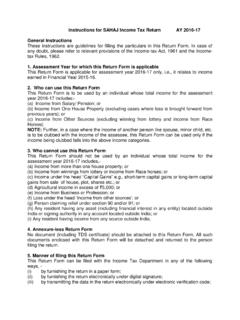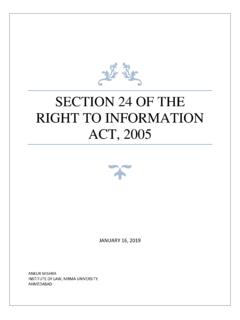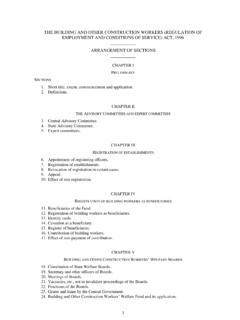Transcription of TDS ON SALARIES - Income Tax Department
1 Income TAX DEPARTMENTD irectorate of Income Tax (PR, PP & OL)6th Floor, Mayur Bhawan, Connaught CircusNew Delhi-110001 TDSONSALARIESTax Payers Information Series - 35 PREFACEThe provisions of the Income Tax Act, 1961 relating to TaxDeduction at Source from SALARIES are of immense importance inthe context of present scenario when TDS collections account foralmost 39% of total collection of Direct Income Tax Act, 1961 provides for penalties for defaultsin respect of deduction of tax at source and deposit thereof intoCentral Government account. The law is even more strict in casethe tax has been deducted at source but not deposited into the CentralGovernment account in the prescribed manner. In such a case,besides penalties, the law provides even for prosecution.
2 Therefore,the tax deductors need to be well conversant with the provisionsrelating to Tax Deduction at Source. This booklet under the TPIseries is an attempt to put forth various provisions relating to TaxDeduction at Source from SALARIES in a lucid but precise Madhukar K. Bhagat, Addl. CIT, Range-9, Delhi has verypainstakingly updated the booklet as per the provisions of the lawas amended upto Finance Act, 2013. I am sure that this updatededition will be widely accepted by the suggestions for further improvement of the booklet wouldbe : New DelhiDated : ( Garg)Director of Income Tax(PR, PP & OL)This publication should not be construed as anexhaustive statement of the Law. In case of doubt,reference should always be made to the relevantprovisions of the Income Tax Act, 1961, Income TaxRules, 1962, Wealth Tax Act, 1957 and Wealth TaxRules, 1957, and, wherever necessary.
3 ToNotifications issued from time to 1 INTRODUCTION1 CHAPTER 2 OVER VIEW OF THE TDS2 PROVISIONSCHAPTER 3 Income UNDER THE HEAD29 SALARIESCHAPTER 4 Income OTHER THAN SALARIES43 CHAPTER 5 TDS ON PENSION &45 RETIREMENT BENIFITSCHAPTER 6 DEDCUTIONS UNDER CHAPTER-VIA51 CHAPTER 7 PENALTIES & PROSECUTION63 CHAPTER 8 TDS ON SALARY PAYMENTS TO67 NON RESIDENTS & EXPATRIATESCHAPTER 9e-TDS & QUARTERLY73 STATEMENTS OF TDSCHAPTER 10 IMPORTANT CIRCULARS/92 NOTIFICATIONSANNEXURE I-New Form-1695 ANNEXURE II-Form 12 Indian Income Tax Act provides for chargeability of taxon the total Income of a person on an annual basis. The quantumof tax determined as per the statutory provisions is payable as :a)Advance Taxb)Self Assessment Taxc)Tax Deducted at Source (TDS)d)Tax Collected at Sourcee)Tax on Regular AssessmentTax deducted at source (TDS), as the very name impliesaims at collection of revenue at the very source of Income .
4 It isessentially an indirect method of collecting tax which combinesthe concepts of pay as you earn and collect as it is beingearned. Its significance to the government lies in the fact thatit prepones the collection of tax, ensures a regular source ofrevenue, provides for a greater reach and wider base for tax. Atthe same time, to the tax payer, it distributes the incidence of taxand provides for a simple and convenient mode of concept of TDS requires that the person on whomresponsibility has been cast, is to deduct tax at the appropriaterates, from payments of specific nature which are being made toa specified recipient. The deducted sum is required to bedeposited to the credit of the Central Government.
5 The recipientfrom whose Income tax has been deducted at source, gets thecredit of the amount deducted in his personal assessment on thebasis of the certificate issued by the the statute provides for deduction of tax at source ona variety of payments of different nature, in this booklet, anattempt is being made to discuss various provisions relevant onlyto the salaried class of VIEW OF THE Introduction :Section 192 of the , 1961 provides that every personresponsible for paying any Income which is chargeable under thehead salary , shall deduct Income tax on the estimated Income ofthe assessee under the head SALARIES . The tax is required to becalculated at the average rate of Income tax as computed on thebasis of the rates in force.
6 The deduction is to be made at the timeof the actual payment. However, no tax is required to be deductedat source, unless the estimated salary Income exceeds the maximumamount not chargeable to tax applicable in case of an individualduring the relevant financial year. The tax once deducted is requiredto be deposited in government account and a certificate of deductionof tax at source (also referred as Form ) is to be issued to theemployee. This certificate is to be furnished by the employee withhis Income tax return after which he gets the credit of the TDS inhis personal Income tax assessment. Finally, the employer/deductoris required to prepare and file quarterly statements in Form the Income -tax Who is to deduct taxThe statute requires deduction of tax at source from the incomeunder the head salary.
7 As such the existence of employer-employee relationship is the sine-qua-non for taxing a particular receipt underthe head SALARIES . Such a relationship is said to exist when the employeenot only works under the direct control and supervision of his employerbut also is subject to the right of the employer to control the manner inwhich he carries out the instructions. Thus the law essentially requiresthe deduction of tax when;(a) Payment is made by the employer to the employee.(b) The payment is in the nature of salary and(c) The Income under the head SALARIES is above the maximumamount not chargeable to the various categories of employers, the personsresponsible for making payment under the head SALARIES and fordeduction of tax are as below:In the case of,1.
8 Central/State -The designateddrawing &disbursing Private & Public Companies-The companyitself as also theprincipal .Firm-The managingpartners/partner ofthe HUF-Karta of the HUF5. Proprietorship concern-The proprietor ofthe said case of a company, it is to be noted, that though the companymay designate an officer /employee to make payments on the behalf321As per sub section 4 of Sec 192, the trustees of a recognised provident fundare required to deduct tax at source at the time of making payment of theaccumulated balance due to an employee. The TDS is to be made in a casewhere sub-rule 9 of part - A of Fourth Schedule of the Act applies and thededuction is to be made as per rule 10 of part A of Fourth the company, still the statutory responsibility to deduct tax atsource rests with the company and its principal officer thereof.
9 Inrespect of companies, the Section 2(35) has specifiedprincipal officer to mean:(a) Secretary, Treasurer, Manager or agent of the company.(b) Any person connected with the management or administrationof the company or upon whom the assessing officer has servedthe notice of his intention to treat him as a principal TDS on simultaneous employment with more thanone employer or on change of employmentSub-Section 2 of Section 192 provides that where a person issimultaneously employed with more than one employer, he mayfurnish the particulars of salary payments and TDS to the employerof his choice. Similarly, on change of employment the particulars ofsalary and TDS of earlier employment may be furnished to thesubsequent employer. These particulars are to be furnished in Form12 B in accordance with Rule 26A of the The employeron receipt of such information is required to take into account theparticulars of salary and TDS and then deduct tax at sourceconsidering the aggregate salary from all When is tax to be deductedSection 192 casts the responsibility on the employer, of taxdeduction at source, at the time of actual payment of salary to theemployee.
10 Unlike the provisions of TDS, pertaining to paymentsother than salary where the obligation to deduct tax arises at thetime of credit or payment, which ever is earlier, the responsibilityto deduct tax from SALARIES arises only at the time of , when advance salary and arrears of salary has been paid,the employer has to take the same into account while computingthe tax case of every individual resident in india who is of ageof 60 years or more and below 80 years at any time duringthe previous year :-54(i) Where the total Income doesnot exceed Rs. 2,00,000/-.(ii) Where the total incomeexceeds Rs. 2,00,000/- but doesnot exceed Rs. 5,00,000/-.(iii) Where the total incomeexceeds Rs. 5,00,000/- but doesnot exceed Rs.
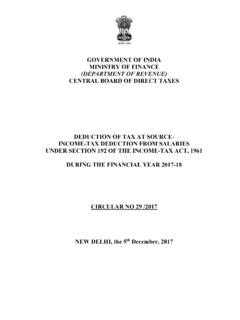

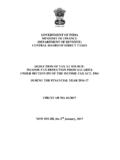
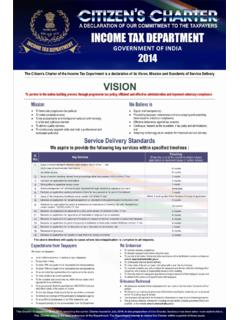
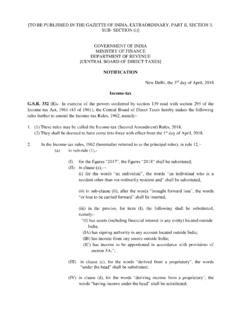
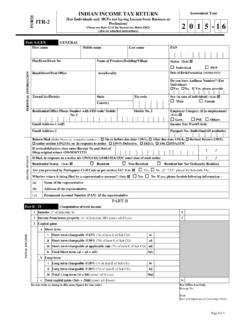

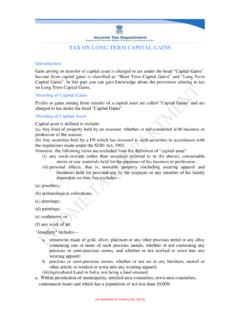
![FORM NO. 3CA [See rule 6G(1)(a)] Audit report …](/cache/preview/5/e/9/7/6/b/7/4/thumb-5e976b74d05a63207c471fc48a86f3e5.jpg)
